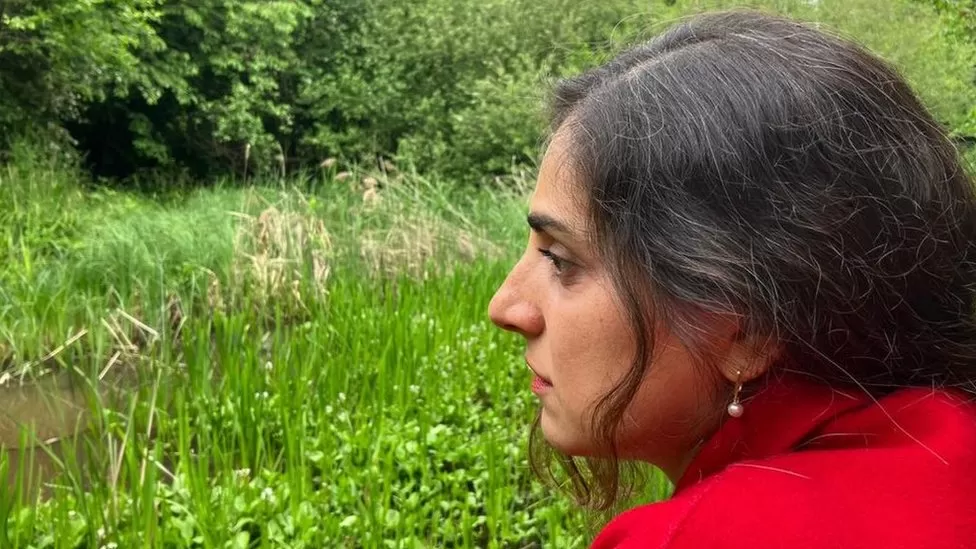Aras Amiri highlights jailed Iran environmentalists' plight

Among the many thousands of political prisoners in Iran's jails are seven prominent environmentalists who were arrested in 2018. The former British Council employee, Aras Amiri, spent two and a half years imprisoned with two of them. She was released last year, and is now speaking out for the first time to draw attention to their plight.
(BBC) Among the many thousands of political prisoners in Iran's jails are seven prominent environmentalists who were arrested in 2018. The former British Council employee, Aras Amiri, spent two and a half years imprisoned with two of them. She was released last year, and is now speaking out for the first time to draw attention to their plight.
Aras Amiri has every reason to look forward in her life.
Since coming back to the UK, she has married, moved to Jersey and is now six months pregnant.
But every day, her mind takes her back to Evin prison in Tehran - and to those she left behind when she was released.
Like other political prisoners, the former London-based British Council arts manager spent time in solitary confinement, where she was threatened, blindfolded and interrogated around the clock.
Accused of working against the regime, she was given a 10-year sentence after declining to co-operate with Iranian intelligence, although she was eventually acquitted after appealing to Iran's Supreme Court.
She still has nightmares about her ordeal.
"It's an experience that breaks many people," she says. "And it has long-lasting effects on all of us."
But it's not herself she wants to talk about. Ms Amiri was held - together with Nazanin Zaghari-Ratcliffe - in the women's wing of Evin along with two environmentalists, Niloufar Bayani and Sepideh Kashani.
"My heart burns for them," she says. "They were my best friends there. And it's just so unfair."
Bayani and Kashani were arrested in early 2018 along with Kashani's husband, Houman Jokar, Amirhossein Khaleghi, Sam Rajabi, Taher Ghadirian and Morad Tahbaz, who also holds British and American citizenship - all members of the Persian Wildlife Heritage Foundation (PWHF).
Its director, Canadian-Iranian dual national Kavous Seyed-Emami, died in suspicious circumstances while under interrogation shortly after his arrest.
The group had been using cameras to track critically-endangered wild Asiatic cheetahs, but were accused of using their environmental projects as a "cover to collect classified information". Even though a committee of Iranian ministers concluded there was no evidence that they were spies, a Revolutionary Court convicted them in 2019 on various national security charges and sentenced them to between six and 10 years in prison.
"Their arrest is part of a wider suppression of Iran's environmentalists," Ms Amiri says. "And there is no accountability. The whole process of the judiciary is a dark joke."
Best known for their work trying to conserve Asiatic cheetahs, she says they also worked with Persian leopards, dolphins and turtles in Qeshm Island, Asiatic bears, as well as migratory birds.
"They did such important work. Their projects were always supported by local people. It's a loss for the whole of Iran."
The UN Environment Programme, where Niloufar Bayani had worked as a consultant for several years before joining the PWHF, has called for their release. Ms Amiri says that Bayani and Kashani were "joyous" company in jail, despite everything they had endured, including two years of solitary confinement.
"They are such generous souls - determined to make life beautiful. We still managed to laugh together. I was very lucky to have been held with them."
She describes the psychological pressure exerted on them during their interrogations as "so appalling, it's difficult even to imagine".
Bayani wrote to court that she was threatened with sexual assault, was forced to mimic the sounds of wild animals and was shown pictures of the body of Kavous Seyed-Emami and told she and her colleagues would suffer a similar fate unless they confessed.
In a letter written from jail on the fifth anniversary of their arrest, Kashani said she had been interrogated in a room with "blood all over it", and threatened with hanging. Her interrogators told that her husband would die like Seyed-Emami. Both women were held in the much-feared 2A section of Evin prison - controlled by Iran's Revolutionary Guards - at the same time as the Australian academic, Kylie Moore Gilbert, who was accused of espionage and sentenced to 10 years before being freed in a prisoner swap.
Released in 2020, Ms Moore-Gilbert dedicated her memoir of her time in jail to the two women, describing them as "sisters in suffering and injustice" who used to secretly share notes of encouragement and food with her at great risk to themselves.
"Their love, solidarity and selfless care for me, a foreigner to whom they owed nothing, was the difference between surviving the mental torture of solitary confinement and succumbing to the deliberate cruelty and degradation of Iran's prison regime," she told the BBC.
"The injustice of Nilou and Sepideh's imprisonment continues to torment me, and not a day goes by when I don't think of them and hope for news of their release."
Aras Amiri got to know the women when they were transferred from 2A to the general women's wing of Evin.
"They're loved so much by all the prisoners," she says. "And they really shared with us the love they have of nature. I just want them to be back with their families, back in nature, and back protecting Iran's wildlife again."